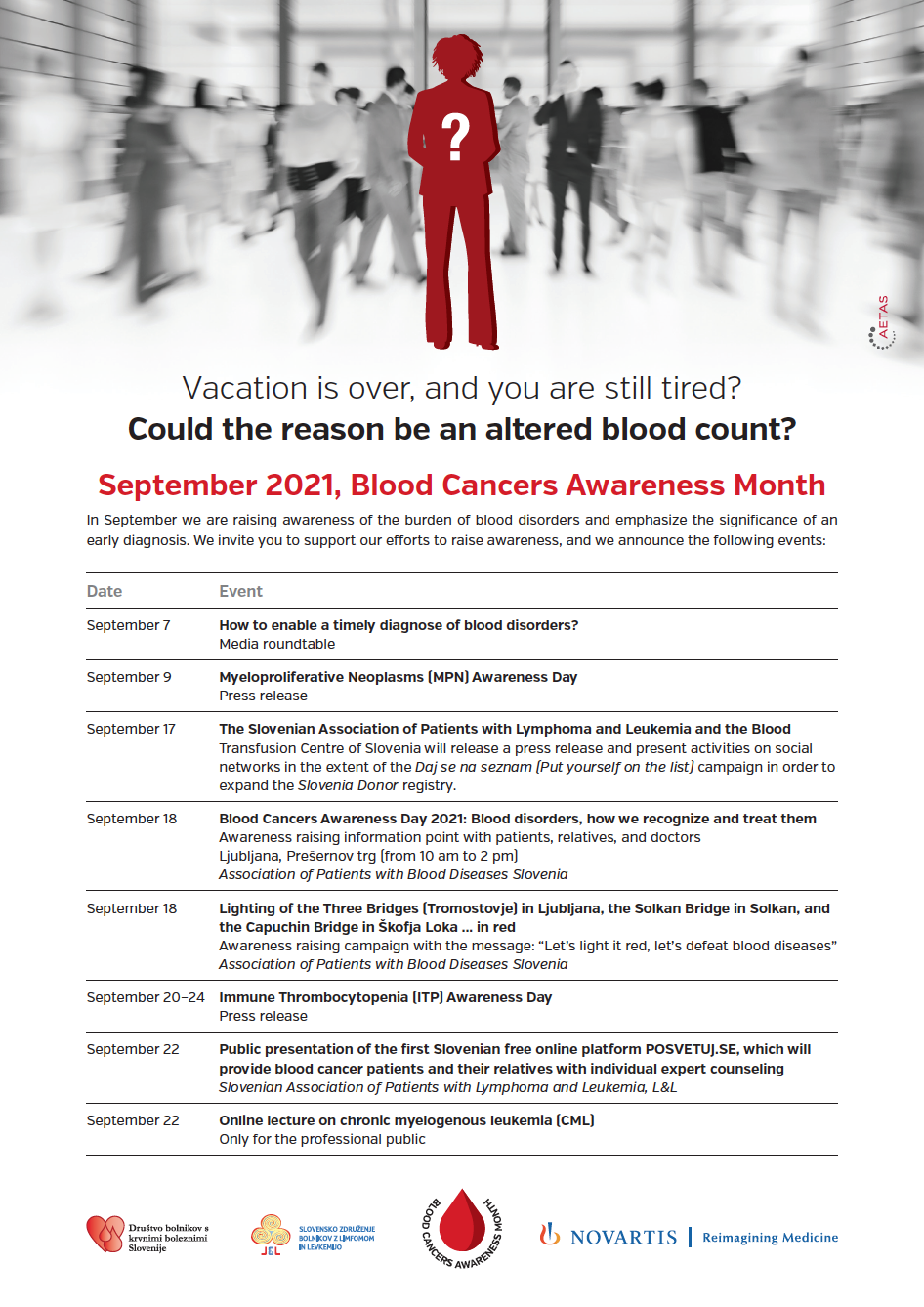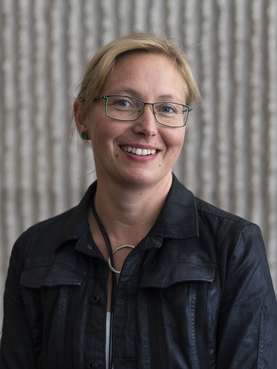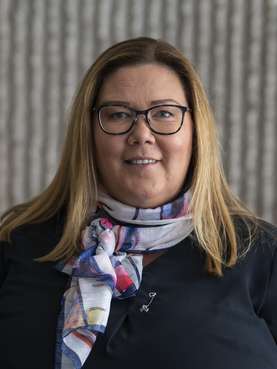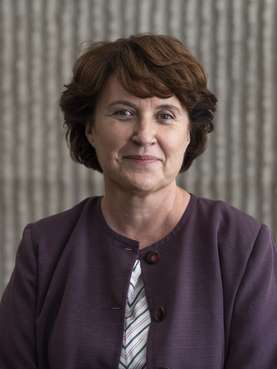September 15, World Lymphoma Awareness Day
In the campaign to raise awareness of blood diseases during the World Lymphoma Awareness Day we emphasize the importance of an early diagnosis of this disease, which is the most common blood disease. In the last months, an increased number of patients in the late phase of the disease has been admitted to the Lymphoma Department at the Institute of Oncology.
“Treatment is also less successful than it would be if we were dealing with earlier phases of the disease, there are more complications, the patients are more tired and fragile. Some postpone visiting the doctor and think that enlarged lymph nodes will get better because they are not willing to deal with the protocols to enter the health center. Patients avoid health centers and wait until it gets really bad. I think the consequences of COVID-19 regarding oncology patients will reveal themselves later, not immediately. The death rate will increase for solid cancers as well as hematology cancers,” warned Jana Pahole, internist and oncologist at the Department of Treatment of Lymphoma in the Medical Care Sector at the Institute of Oncology Ljubljana.
The executive director of the Slovenian Association of Patients with Lymphoma and Leukemia Kristina Modic warned about the responsibility of each individual in successfully dealing with the new corona virus, as this virus distinctly threatens the most immunocompromised groups of the population, among them patients with blood cancers: “The fourth wave must not further hinder the population’s access to primary level health care and delay diagnoses of oncologic diseases. An individual with suspicion of cancer simply cannot afford and should not wait for a diagnosis and medical examination, as even the most modern therapies often prove helpless in case of a late diagnosis. This is why I appeal to people to monitor how they feel, be alert of long-lasting body changes or health issues, and despite potential restrictions and changes of the access to health care services find and demand medical assistance as soon as they need it. COVID-19 can represent a grave risk for immunocompromised people, and patients with blood cancers definitely fall into this group. These patients are not threatened only by COVID-19 but also and mostly by their primary disease, which is cancer. This is why I let health care authorities know that hemato-oncological patients and patients with other forms of cancer need and deserve a modern and complete treatment in a timely and accessible fashion, a part of which is also receiving a timely and quick diagnosis.”
Lymphomas are divided into two main groups
Non-Hodgkin's lymphoma (NHL) affects people of all age groups but is more common in adults than children. The average age at which the disease is diagnosed is 65. It affects men as well as women but is a little more common in men. Non-Hodgkin's lymphoma more often affects people with a compromised immune system – either genetic or acquired (effect of immunosuppressive medications, HIV infection).
| NON-HODGKIN'S LYMPHOMA SYMPTOMS: | NON-HODGKIN'S LYMPHOMA SIGNS: |
| increased body temperature | enlarged, painless, and movable lymph nodes on the neck, above the collarbone, below the armpits, or in the groin |
| night sweating | swelling of the face and upper part of the body |
| weight loss | enlarged liver and spleen |
| fatigue | |
| sleepiness | |
| headache | |
| persistent itching | |
| chest pain | |
| cough | |
| shortness of breath | |
| discomfort in the stomach and various parts of the spine | |
The goals of treatment of non-Hodgkin's lymphoma are different based on the type of the disease. Depending on the course of the disease, non-Hodgkin's lymphoma are divided into two sub-groups:
- indolent or “slow-growing” lymphoma
- aggressive non-Hodgkin's lymphoma (NHL) develops faster than indolent lymphoma. Diffuse large B-cell lymphoma is the most common form of aggressive lymphoma. The signs and symptoms of the disease are mostly expressed at the time of the diagnosis. The long-term prognosis for these patients is better than with indolent lymphoma: from 40 to 75 percent of patients with aggressive lymphoma achieve full remission of the disease, and the goal of treatment is full recovery. The chance of full recovery depends on how spread the lymphoma is (stage of the disease) when the diagnosis is made – lower stage means higher chance of recovery.
Hodgkin's lymphoma (HL) is cancer of the lymphatic system that is most common in two distinct age groups - in young people between 15 and 34 years of age and in people older than 50 years. The Hodgkin's lymphoma is much rarer than non-Hodgkin's lymphoma and represents only 10% of lymphomas. In the recent years, each year in Slovenia we discover between 45 and 65 new patients with Hodgkin's lymphoma.
Because the first symptoms and signs of Hodgkin's lymphoma are similar to cold, patients often delay visiting a doctor. Personal physicians can also have troubles recognizing the first symptoms and signs of the Hodgkin's lymphoma, as blood tests with increased inflammation parameters are often misleading and lead to a diagnosis of infection. In order for a doctor to determine what is actually going on with a patient, they must follow the dynamics of symptoms and signs of the disease.
| HODGKIN'S LYMPHOMA SYMPTOMS: | HODGKIN'S LYMPHOMA SIGNS: |
| trouble breathing | enlarged, painless, and movable lymph nodes on the neck, above the collarbone, below the armpits, or in the groin |
| chest pain | swelling of the face and upper part of the body |
| dry irritating cough | enlarged liver and spleen |
| stomach pain | |
| urinary retention | |
| constipation | |
| night sweating | |
| 10% weight loss in the last six months | |
| increased body temperature | |
The prognosis of the disease is good. Most patients (75% on average) will recover after adequate treatment. Naturally, the chance for recovery depends on how much the disease has progressed.
Invaluable support of patient organizations
To diagnose and treat the disease and provide support to the patients are numerous health care workers, lead by hematologists and oncologists, with the invaluable support of the Slovenian Association of Patients with Lymphoma and Leukemia, L&L, and the Association of Patients with Blood Diseases Slovenia.
The Slovenian Association of Patients with Lymphoma and Leukemia, L&L, due to their rehabilitation program and numerous other free programs to help patients with blood cancers and their relatives prepared in cooperation with various healthcare experts, serves an important role in complementing health care where the system does not provide it yet. “The program for rehabilitation provides great additional value for patients, improves their quality of life, raises treatment success, and facilitates management of the disease. The program is available to the patients as soon as they need it. At the time of COVID-19 restrictions, we operate entirely online, and we are surprised to notice that patients have adapted extremely well to the information technology. Since the program is running online, it is available to patients from the entire Slovenia and is now also accessible to people who live in remote places. It is evident that life under the new circumstances is even more difficult for the patients, who seek help and support and are increasingly active in entering support programs and rehabilitation,” points out Kristina Modic.
The Association of Patients with Blood Diseases Slovenia performs the program Bolnik – bolniku, a non-professional psychological assistance and support program, which takes place in hematology departments at the University Medical Centre Ljubljana and Maribor and at the General Hospitals Novo mesto and Slovenj Gradec. All patients getting treated at the department and their relatives can communicate with a recovered patient. Psychological support is also active during the epidemic. The program is performed by nine recovered patients.
“The possibility to talk to someone who already dealt with and defeated the disease has great psychological importance and gives the patient the will to further face the disease and its troubles and have greater hope of recovery,” explained Anica Kralj Štimec.
Vacation is over, and you are still tired?
If we experience heavy fatigue even after a long vacation and without anything causing it, we must find a reason for it with the assistance of our physician. Fatigue is one of the common symptoms of numerous blood disorders, which includes lymphoma.
The signs and symptoms of blood disorders are very general, which is why the discovery of blood diseases is difficult and often they do not get enough attention. One things holds true for all blood diseases: an early discovery is very important for the success of treatment and the survival of patients.
The campaign in September, the Blood Cancer Awareness Month, is organized in cooperation with the Association of Patients with Blood Diseases Slovenia and the Slovenian Association of Patients with Lymphoma and Leukemia, L&L, with expert support of hematologists and oncologists. The campaign was made possible by Novartis.
Numerous awareness-raising events will take place in September. You are invited to join them!

Sources:
- website of the Slovenian Association of Patients with Lymphoma and Leukemia. Accessible at: https://www.limfom-levkemija.org/domov.html. Last accessed on: September 10, 2021.
- website of the Association of Patients with Blood Diseases Slovenia. Accessible at: http://www.drustvo-bkb.si/. Last accessed on: September 10, 2021.
- roundtable at the introduction into the Blood Cancer Awareness Month Vacation is over, and you are still tired? Accessible at: https://livestream.com/accounts/564247/events/7618799/videos/225717251/player
For more information please contact:
Katarina Klemenc
Head Communications and Patient Engagement
Phone: +386 1 580 22 43
katarina.klemenc@novartis.com



